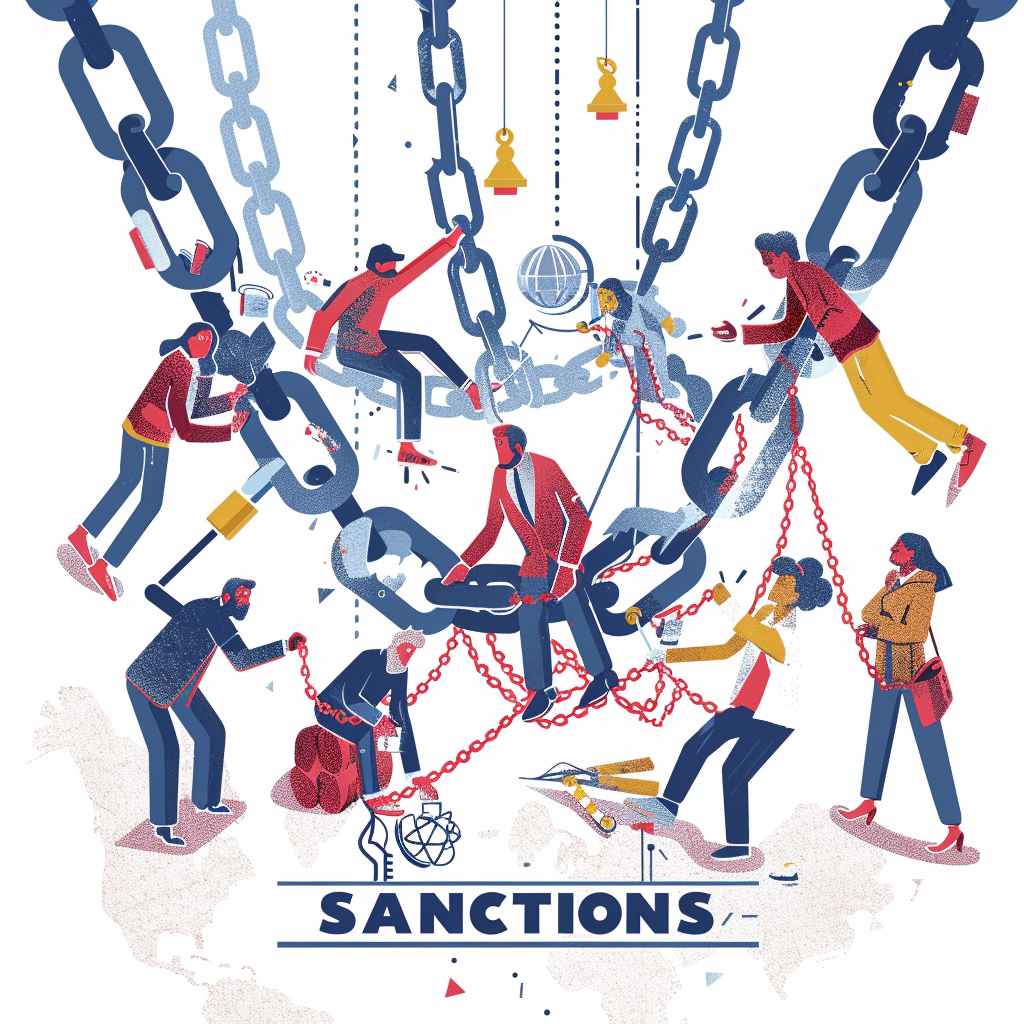Sanction
Definition
Sanction can refer to a measure of approval, support or permission, or conversely, to a penalty aimed at influencing behavior.
Parts of Speech
- Noun
- Verb
Pronunciation
American English
- IPA Pronunciation: /ˈsæŋkʃən/
- Respelling: SANGK-shuhn (with "SANGK" as in "bank," and "shuhn" resembling the sound in "mission")
British English
- IPA Pronunciation: /ˈsæŋkʃn/
- Respelling: SANGK-shn (similar to American English, with "SANGK" as in "bank," and "shn" indicating a slightly more clipped ending than in American English)
In both dialects, "sanction" has a clear "SANGK" sound at the beginning, followed by a "shn" sound that ends the word. The primary difference in respelling reflects the slightly tighter pronunciation typically heard in British English.
Etymology
The term "sanction" is derived from the Latin word sanctio, from sancire which means 'to decree, confirm, ratify, make sacred'.
Derivatives
- Sanctionable
- Sanctioner
- Sanctioning
- Unsanctioned
- Sanctionless
Synonyms
- Authorization
- Approval
- Endorsement
Antonyms
- Prohibition
- Veto
- Disapproval
Usage
The term 'sanction' can be used both as a form of approval or a punitive measure depending on the context.
Related Terms
- Sanctionable
- Unsanctioned
Detailed Definition
Noun
- Approval: Formal consent or authorization to proceed with a certain action or plan.
- Example: The project received the necessary sanction from the authorities.
- Penalty: A penalty, usually economic in nature, levied to influence behavior or policy.
- Example: The international community imposed sanctions on the country due to its nuclear activities.
Verb
- To Authorize: To give official permission or approval for an action.
- Example: The board sanctioned the new development plan.
- To Penalize: To subject to a penalty, especially for the violation of a moral principle or international law.
- Example: The athlete was sanctioned for using performance-enhancing drugs.
sanction



🇨🇳 Mandarin
- 制裁 (zhìcái) - [as in penalties or restrictions]
- IPA Pronunciation: /ʈʂʐ̩˥˩.tsʰaɪ˨˩˦/
- Respelling in English: zhih-tsai
- 批准 (pīzhǔn) - [as in approval or permission]
- IPA Pronunciation: /pʰi˥ ʈʂʐ̩˨˩˦/
- Respelling in English: phee-zhun
🇮🇳 Hindi
- प्रतिबंध (pratibandh) - [as in penalties or restrictions]
- IPA Pronunciation: /pɾə.ti.bʌndʱ/
- Respelling in English: prat-i-bandh
- अनुमति (anumati) - [as in approval or permission]
- IPA Pronunciation: /ə.nu.ma.t̪i/
- Respelling in English: anu-ma-tee
🇪🇸 Spanish
- sanción - [as in penalties or restrictions]
- IPA Pronunciation: /sanˈθjon/
- Respelling in English: san-thyon
- aprobación - [as in approval or permission]
- IPA Pronunciation: /apɾobaˈθjon/
- Respelling in English: a-pro-ba-thyon
🇫🇷 French
- sanction - [as in penalties or restrictions]
- IPA Pronunciation: /sɑ̃k.sjɔ̃/
- Respelling in English: sahnk-syon
- approbation - [as in approval or permission]
- IPA Pronunciation: /apʁɔ.ba.sjɔ̃/
- Respelling in English: a-pro-ba-syon
🇸🇦 Modern Standard Arabic
- عقوبة (‘uqūba) - [as in penalties or restrictions]
- IPA Pronunciation: /ʕuː.qʊ.bah/
- Respelling in English: oo-koo-bah
- موافقة (muwāfiqa) - [as in approval or permission]
- IPA Pronunciation: /muːˈaː.fi.qaː/
- Respelling in English: moo-aa-fee-qaa
🇧🇩 Bengali
- শাস্তি (śāsti) - [as in penalties or restrictions]
- IPA Pronunciation: /ʃaːsti/
- Respelling in English: shaas-tee
- অনুমোদন (anumōdan) - [as in approval or permission]
- IPA Pronunciation: /ənumod̪ɔn/
- Respelling in English: anu-modon
🇷🇺 Russian
- санкция (sanktsiya) - [as in penalties or restrictions]
- IPA Pronunciation: /sankˈtsijə/
- Respelling in English: sank-tsee-ya
- одобрение (odobreniye) - [as in approval or permission]
- IPA Pronunciation: /ədɐˈbrʲenʲɪje/
- Respelling in English: o-do-brye-nye-ye
🇵🇹 Portuguese
- sanção - [as in penalties or restrictions]
- IPA Pronunciation: /sɐ̃wˈsɐ̃w̃/
- Respelling in English: saum-saum
- aprovação - [as in approval or permission]
- IPA Pronunciation: /ɐpɾuvaˈsɐ̃w̃/
- Respelling in English: a-proo-va-saum
🇮🇩 Indonesian
- sanksi - [as in penalties or restrictions]
- IPA Pronunciation: /ˈsaŋk.si/
- Respelling in English: sangk-see
- persetujuan - [as in approval or permission]
- IPA Pronunciation: /pər.seˈtʊ.ju.an/
- Respelling in English: per-se-too-yoo-an
🇩🇪 German
- Sanktion - [as in penalties or restrictions]
- IPA Pronunciation: /zaŋkˈtsi̯oːn/
- Respelling in English: zangk-tsee-on
- Genehmigung - [as in approval or permission]
- IPA Pronunciation: /ɡəˈneːmɪɡʊŋ/
- Respelling in English: geh-nay-mi-gung
🇯🇵 Japanese
- 制裁 (seisai) - [as in penalties or restrictions]
- IPA Pronunciation: /seː.sai̯/
- Respelling in English: say-sai
- 認可 (ninka) - [as in approval or permission]
- IPA Pronunciation: /ɲiŋ.ka/
- Respelling in English: nin-ka
🇻🇳 Vietnamese
- trừng phạt - [as in penalties or restrictions]
- IPA Pronunciation: /ʈʂyn˧˩˧ pʰaːt˧˩˧/
- Respelling in English: trung phat
- phê duyệt - [as in approval or permission]
- IPA Pronunciation: /fɛ˧˩˧ zwiət˧˩˧/
- Respelling in English: fay zwi-et
🇰🇷 Korean
- 제재 (jejae) - [as in penalties or restrictions]
- IPA Pronunciation: /t͡ɕe.d͡ʑe/
- Respelling in English: jeh-jeh
- 승인 (seungin) - [as in approval or permission]
- IPA Pronunciation: /s͈ʌŋ.in/
- Respelling in English: seung-in
🇹🇷 Turkish
- yaptırım - [as in penalties or restrictions]
- IPA Pronunciation: /jap.tɯ.ɾɯm/
- Respelling in English: yap-ty-rum
- onay - [as in approval or permission]
- IPA Pronunciation: /o.naj/
- Respelling in English: o-nay
🇵🇰 Urdu
- سزا (saza) - [as in penalties or restrictions]
- IPA Pronunciation: /sə.zɑː/
- Respelling in English: sa-zaa
- منظوری (manzoori) - [as in approval or permission]
- IPA Pronunciation: /mən.zuː.riː/
- Respelling in English: man-zoo-ree





